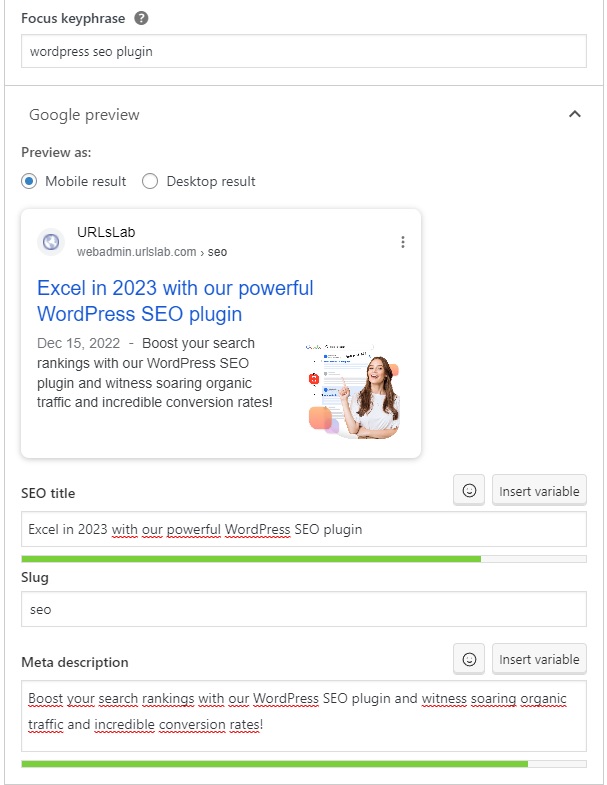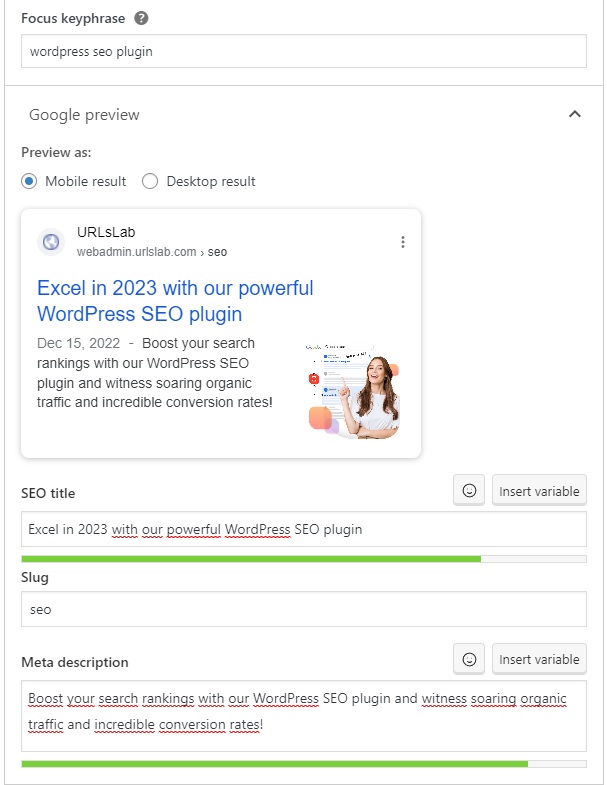What Is SEO Title
Discover what an SEO title is, why it matters, and how to craft effective page titles to improve search rankings and drive more traffic.

SEO title
- Role of SEO titles in optimization
- Effective SEO page title traits
- Incorporating keywords
- User experience and click-through rate
- Tips for crafting the perfect SEO title
- Comprehend search query and intention
- Appropriate character limits
- Primary keywords at the beginning
- Avoid keyword stuffing
- Common SEO title tag mistakes
- Repetitive or irrelevant text
- Too many keywords
- Long title tags
- Error in the element
- 3 Good and bad SEO title examples
- FAQ
- What is an SEO page title?
- How to craft great page titles for SEO?
- Should you add your brand to the SEO title?
- What is CTR, and why does it matter?
- What tools can help you write page titles?


In today’s digital landscape, a robust online presence is crucial for businesses to succeed. Search Engine Optimization (SEO) plays a key role in ensuring your website is easily discoverable by both users and search engines. One critical aspect of SEO is devising informative and captivating SEO titles. An SEO title or an SEO title tag refers to the title of a webpage that appears in search results and web browsers. This title serves as a headline, offering a glimpse of the content while incorporating the targeted keyword.
SEO title tags are vital for achieving high search engine rankings, as they assist search engines like Google in determining the relevance of your content to specific keywords. Alongside SEO titles, meta descriptions provide a concise summary of your webpage. Businesses need to comprehend the significance of crafting targeted titles and employing effective SEO strategies for meta descriptions. By optimizing titles and descriptions harmoniously, businesses can significantly improve visibility, drive traffic, and ultimately attract potential customers.
Role of SEO titles in optimization
SEO title tags sometimes referred to as meta descriptions, are crucial for search engine optimization (SEO). These concise snippets of text describe a webpage’s content and appear on search engine results pages (SERPs). By integrating targeted keywords, SEO titles convey the relevance of a page to both users and search engines, affecting visibility, ranking, and user engagement.
Business owners need to learn how to craft SEO title tags when optimizing their websites. Developing the best SEO titles requires the use of relevant keywords and aligning with the users’ search intent. In the case of blog posts, an effectively written title not only captures the attention of potential readers but also highlights the content’s relevance to search algorithms.
Being an important ranking factor, SEO titles have a substantial impact on SERPs and click-through rates (CTR). Perfecting the art of creating SEO titles is crucial for achieving higher organic search rankings, increasing website traffic, and promoting consumer engagement.
Effective SEO page title traits
Successful SEO page titles, or title tags, significantly impact search visibility and performance. Craft effective titles, incorporate the primary keyword, and relevant long-tail keywords, and uniquely describe the page content. Titles should be engaging, informative, and around 50-60 characters long for optimal display.
Consider search intent and avoid duplicate titles for better rankings. Using long-tail keywords targets specific user queries, resulting in higher click-through rates. Implementing these elements in your SEO strategy boosts search performance and online visibility for your business.
Incorporating keywords
The significance of using appropriate keywords in SEO title tags cannot be overstated, as it plays a crucial role in determining the visibility and ranking of your website in search engine results. A target keyword, also known as the primary keyword, should be carefully selected as it represents the main search term that accurately reflects the search intent of your potential audience.
Proper keyword placement in SEO title tags is essential for maximizing your website’s visibility and ranking. Implement long-tail keywords within meta titles to refine your site’s relevance to user queries. Place the focus keyword strategically and naturally within the title, ensuring it stands out with catchy phrasing. Explore variations and synonyms that align with search engine ranking algorithms to further optimize your page titles.
User experience and click-through rate
User experience greatly influences click-through rates (CTR), and optimizing SEO title tags can enhance this relationship. SEO title tags are HTML elements that define webpage titles, assisting search engines and enticing potential readers. Crafting compelling titles incorporating keyword variations is essential for satisfying both purposes.
Understanding the ranking algorithm, which refers to methods used by search engines to determine search results, is also crucial. By designing titles that cater to users and ranking algorithms, the chances of attaining a higher CTR significantly increase. However, failure to optimize titles or provide a bad user experience might result in low engagement and poor rankings, undermining the potential benefits of your SEO efforts.
Tips for crafting the perfect SEO title
Navigating the ever-changing landscape of Search Engine Optimization (SEO) is crucial for businesses to maintain a competitive digital edge. This guide aims to equip business owners with essential SEO techniques, such as SEO title tags, title tag definition, and keyword variations. SEO title tags, or page titles, significantly influence search engine indexing and determine your website’s relevance to specific search queries.
To optimize your site, strategically craft title tags with accurate keywords that reflect your webpage content and resonate with your target audience’s search queries. This guide also emphasizes the importance of adhering to appropriate character limits, avoiding keyword stuffing, and understanding ranking algorithms to maximize visibility and improve your page ranking in the online marketplace.

Comprehend search query and intention
Grasping the intent behind search queries is crucial for business owners and digital marketers aiming to create effective SEO titles. Search queries are words or phrases users type into search engines, whereas search intent represents the goal or reason behind these queries. By focusing on search intent, you can craft captivating SEO titles that entice users to click on your content and meet their needs.
SEO titles serve as the first contact between your content and potential clients, so they must accurately address the concerns or interests of your target audience. Understanding search intent helps you create targeted and engaging SEO titles, improving website traffic, click-through rates, and overall digital marketing performance. Therefore, when crafting an SEO title, make sure it is not just a generic replication of your original title, but a thoughtfully designed expression of the underlying search intent, ultimately leading to valuable business opportunities.
Appropriate character limits
In the world of digital marketing, adhering to recommended character limits for elements such as meta title tags and browser window tabs is crucial for optimizing your website content to improve search engine optimization (SEO). A meta title, also known as an SEO title, is the main title shown in search results and browser tabs, playing a significant role in how search engine algorithms determine the relevance of your website.
To comply with character limits, it’s recommended to keep your SEO title between 50-60 characters, including spaces. Staying within this character count improves the chance of your entire title being displayed in search results, thus enhancing user experience and boosting your website’s search ranking.
By carefully observing character limits and including meaningful keywords in the meta title, business owners can ensure better search engine optimization results for their digital marketing efforts.
Primary keywords at the beginning
The art of crafting a high-impact SEO title is instrumental in driving website traffic and elevating search engine rankings. The placement of primary keywords at the start of the SEO title offers crucial benefits for better visibility and impact. A well-structured SEO title differs from the original title, as it is designed to be both engaging for the reader and easily understood by search engine algorithms.
Writing an SEO title with the primary keyword in mind is an effective strategy. Make sure the keyword is relevant to the content and chosen with the target audience in mind. As content creators optimize their articles with carefully chosen keywords, they not only cater to potential visitors and boost engagement but also fulfill search engine requirements, ultimately allowing their content to be discovered and consumed more readily by their target audience.
Avoid keyword stuffing
Overusing keywords in SEO titles, also known as keyword stuffing, can negatively impact the ranking of your webpage in search engine results. As a business owner, it is essential to understand how to write an SEO title that is both descriptive and compelling, without going overboard on repetitive terms. Crafting the best SEO title involves more than simply including your target keyword; it also requires the creation of a descriptive title rich in relevant information that accurately portrays the content of your page.
Search engines, such as Google, are continuously improving their algorithms to detect instances of keyword stuffing and penalize websites that engage in this practice. This means that the overuse of keywords in your SEO titles, with the exclusion of a helpful and compelling context, can ultimately hinder your website’s success. To avoid this pitfall, focus on composing engaging titles that provide value to users, while maintaining appropriate keyword use, to ensure your website maintains a strong standing in search engine rankings.
Common SEO title tag mistakes
Crafting effective SEO titles is crucial for a successful online marketing strategy, yet it’s essential to avoid common pitfalls. Conduct thorough keyword research to ensure relevancy, maximizing user searches and search bot visibility. Create catchy titles that balance both creativity and information to capture the audience’s attention. Avoid alternate titles to prevent duplicate content issues and optimize the site’s performance. Lastly, ensure the content management system’s default SEO title meets requirements, as relying solely on automatic titles may compromise marketing success. In summary, business owners should be mindful of poor keyword research, lack of creativity, duplicate content, and ineffective title tags to develop an impactful SEO strategy driving traffic and results.
Repetitive or irrelevant text
Creating the best SEO titles is a crucial factor in driving organic traffic to your website. Crafting a catchy title not only captivates your audience’s attention but effectively communicates the content’s purpose to both the reader and search engine algorithms. However, a common mistake that may have negative consequences on your website’s ranking involves the excessive use of monotonous or unrelated text in SEO titles. Incorporating an effective title tag that focuses on your target keyword without sacrificing readability and relevance is essential in attracting both your audience and the search bots responsible for indexing your content accurately.
When constructing an SEO title, it’s vital to prioritize clarity, meaning, and correct phrasing while maintaining a keyword-rich focus throughout the tag. Ultimately, an intriguing and coherent title will enhance your website’s chances of appearing in relevant searches, and in turn, improve its overall ranking performance in search engine result pages.
Too many keywords
Incorporating keywords effectively and professionally into your website’s SEO title is essential for attracting traffic by increasing your visibility on search engine results. However, it is crucial to be cautious of the drawbacks associated with the excessive use of keywords within a page title for SEO purposes. Over-stuffing the title with keywords can negatively impact user experience, as it may make it challenging for audiences to quickly understand the content, and can create an unprofessional image for your business.
Furthermore, search engines such as Google penalize websites that excessively use keywords, potentially reducing your rankings in searches. This is because search bots are designed to identify and avoid over-optimized titles, favoring pages with organic descriptions and concise keywords that align with the user’s search intent.
As a result, the excessive use of keywords in your site’s SEO title may cause your online reputation to deteriorate, while also hampering your ability to reach potential customers who rely on search engines to access your services and products.
Long title tags
Long title tags can harm your website’s SEO performance, as they may be truncated in search engine results pages (SERPs) and lead to reduced click-through rates. Additionally, an overly lengthy SEO title may result in lower rankings in organic searches. To keep your SEO titles concise and effective, consider these strategies:
- Prioritize keywords: Place vital keywords relevant to your content and audience at the beginning of the SEO title to capture user attention and search bot indexing.
- Limit character count: Aim for 60-70 characters in your page titles for optimal SEO and SERP display without truncation.
- Opt for readability: Compose your SEO title clearly, succinctly, and enticingly, avoiding unnecessary jargon or repetitive information.
- Be unique: Ensure your title is distinctive and accurately describes the specific page content, avoiding duplicate title tags that might confuse search engines and hurt your website’s ranking.
- Monitor and measure: Regularly review your SEO titles’ performance, adjusting your strategy as needed to improve engagement and rankings. Use analytics tools to gain insights into user behavior and make data-driven optimization decisions.
Error in the element
The <title> element is a crucial component of a webpage’s HTML structure, serving as an essential tool for search engine optimization (SEO). A well-crafted SEO title can help improve your website’s visibility in searches, making it easier for search bots to understand the content of your page and properly index it. However, errors in implementing the <title> element can negatively impact your SEO efforts and result in less visibility for your website.
Common mistakes include using an excessively long or overly short title, neglecting relevant keywords, and duplicating page titles for SEO across multiple pages. To optimize the <title> element within your webpage’s HTML, it is recommended to keep the title concise yet descriptive, focusing on the main topic of the page and incorporating relevant keywords.
Additionally, ensure that unique and accurate titles are used for each page on your website to avoid confusion for both users and search bots. By implementing these suggestions, you can effectively enhance the performance of your website’s SEO title, improve the browsing experience for your target audience, and ultimately drive more organic traffic to your business.
3 Good and bad SEO title examples
1. Good SEO title example: “10 Best Hiking Trails in Colorado: Explore the Great Outdoors”
- Clear, concise, and descriptive
- Primary keyword placed close to the beginning
- Engaging with terms like “best” and “explore the great outdoors”
Bad SEO title example: “Hiking, Trails, Colorado, Outdoors, Top, Best, Explore, Outdoor Adventure, Walking”
- Difficult for users to understand
- Lacks clear structure
- Appears spammy due to keyword stuffing
2. Good SEO title example: “Easy Chocolate Cake Recipe: Bake a Delicious Dessert in 30 Minutes”
- Conveys the topic (chocolate cake recipe)
- Highlights the ease of the recipe
- Mentions a benefit (done in 30 minutes)
Bad SEO title example: “Chocolate Cake Recipe – Ingredients, Baking, Dessert, Time, Flavor, Easy, Quick”
- Poor structure
- Doesn’t inform users about the content of the page
- Lacks appeal due to an unorganized list of keywords
3. Good SEO title example: “Top 5 Yoga Poses for Stress Relief: Relax and Rejuvenate”
- Clearly expresses the content
- Includes the keyword “Yoga Poses for Stress Relief”
- Engaging with terms like “Top 5” and “Relax and Rejuvenate”
Bad SEO title example: “Yoga Stress Relief – Poses, Postures, Meditation, Tension Release, Relaxation, Healthy Living”
- Disorganized mix of related terms
- Doesn’t provide precise information about the content
- Appears spammy due to overuse of keywords
FAQ
What is an SEO page title?
A SEO page title is an HTML element that describes the content of a webpage for search engines and users, influencing its search rankings and clickability.
How to craft great page titles for SEO?
Craft great page titles for SEO, include relevant keywords, keep them under 60 characters, make them unique and descriptive, and incorporate numbers or power words if applicable.
Should you add your brand to the SEO title?
Adding your brand to the SEO title can be beneficial for brand recognition and credibility, but should be done concisely, prioritizing the keyword and content description.
What is CTR, and why does it matter?
CTR, or Click-Through Rate, is the number of clicks received on a link compared to its number of impressions; it matters because a higher CTR indicates more effective messaging and a better user experience, often leading to improved search rankings.
What tools can help you write page titles?
Frequently asked questions
- What is an SEO page title?
A SEO page title is an HTML element that describes the content of a webpage for search engines and users, influencing its search rankings and clickability.
- How to craft great page titles for SEO?
Craft great page titles for SEO, include relevant keywords, keep them under 60 characters, make them unique and descriptive, and incorporate numbers or power words if applicable.
- Should you add your brand to the SEO title?
Adding your brand to the SEO title can be beneficial for brand recognition and credibility, but should be done concisely, prioritizing the keyword and content description.
- What is CTR, and why does it matter?
CTR, or Click-Through Rate, is the number of clicks received on a link compared to its number of impressions; it matters because a higher CTR indicates more effective messaging and a better user experience, often leading to improved search rankings.
- What tools can help you write page titles?
SEO tools such as URLsLab, keyword research tools, and WordPress SEO plugins can help you craft optimized and effective page titles for better search performance.
Optimize Your SEO Titles with URLsLab
Enhance your website's visibility and click-through rates by crafting compelling and effective SEO titles. Try URLsLab tools for better SEO performance.
